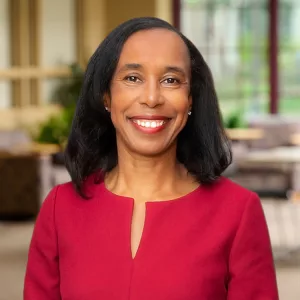Camille Davidson, dean at Southern Illinois University School of Law, will start July 1
The board of trustees of Mitchell Hamline School of Law today announced the appointment of Camille M. Davidson, dean and professor of law at Southern Illinois University School of Law, as the school’s new president and dean.
Davidson, who has served as dean at SIU Law since July 2020, will begin her duties at Mitchell Hamline on July 1, 2024.
“We are extremely pleased and excited that Camille Davidson will be leading the law school,” said Nicole James Gilchrist, chair of the school’s board of trustees. She praised the national search process, much of which was led by former trustee Jim Jacobson. “Camille emerged early as a clear standout in an extremely qualified field,” said Jacobson. “Her extensive experience as a scholar and administrator, commitment to supporting students, and fundraising success make her an excellent choice for Mitchell Hamline.”

Incoming President and Dean Camille M. Davidson
Davidson recently brought in the largest gift in the history of Southern Illinois University—a $10 million donation to the law school. During her time as dean at SIU Law, applications increased to the highest level in 10 years, and the diversity of the entering classes went from 8 percent to more than 28 percent. The employment rate for graduates also increased, from 79% to 94%. In addition to her role as dean of the law school, Davidson also serves as an adjunct professor in SIU’s medical school. At SIU she has taught bioethics, medical malpractice, and a course called Legal Globalization: Kenya.
Before coming to SIU, Davidson spent 11 years as a professor and administrator at Charlotte School of Law and Wake Forest University School of Law. At Charlotte, she taught various health law and trusts and estates courses. She also founded a clinical lab where she supervised students who prepared estate plans for low-income elderly people in the community, and she taught bioethics at the University of Vilnius in Lithuania. At Wake Forest, she taught in the online Master of Legal Studies program.
Davidson began her career in higher education in 2004 with a two-year stint teaching at Davidson College. Her legal career began with a clerkship at the D.C. Superior Court in Washington, D.C., followed by a position as an assistant counsel in the Office of the Legislative Counsel, U.S. House of Representatives. She has also worked as a judicial hearing officer for the state of North Carolina, and in private practice in both health law and estate planning and administration in Charlotte, N.C.
“I am thrilled to be leading Mitchell Hamline,” said Davidson. “Mitchell Hamline’s record of innovation and adaptability—including launching the first-in-the-nation Blended Learning program—speaks to its independence and forward-looking approach.” She also praised the school’s on-campus program, which has trained thousands of attorneys working in Minnesota and the Upper Midwest. As a scholar who specializes in health law, Davidson was drawn to Mitchell Hamline in part because of the school’s Health Law Institute and Public Health Law Center.
Davidson was born and raised in Mississippi. She and her husband have two children. She graduated magna cum laude with a bachelor’s degree in business administration from Millsaps College in Jackson, Mississippi, and earned a J.D. from Georgetown University Law Center. She received the 2015 International Association of Law Schools Collaborative Research Award and presented her work at the international conference in Segovia, Spain. She was also a Rotary International Ambassadorial Scholar and pursued postgraduate studies at the University of Nairobi, Kenya.
Davidson will serve as the third president and dean of Mitchell Hamline School of Law, which was created in 2015 with the combination of William Mitchell College of Law and Hamline University School of Law. She was the first Black woman to serve as dean at SIU Law, and she will also be the first Black woman to serve as president and dean at Mitchell Hamline or any of its predecessor institutions.
Mark C. Gordon was Mitchell Hamline’s first president and dean, from 2015-19. After an interim period led by Peter Knapp, Anthony S. Niedwiecki served as president and dean from 2020-23, followed by interim President and Dean Jim Hilbert, who will turn over leadership to Davidson in July.
MITCHELL HAMLINE SCHOOL OF LAW
With roots dating to 1900, Mitchell Hamline School of Law was established in December 2015 through the combination of William Mitchell College of Law and Hamline University School of Law. It is the largest law school in the region, with approximately 1,200 students and more than 50 full-time faculty. Students can pursue enrollment options that are full time, part time, on-campus, and—through Blended Learning—a mix of online and on-campus. Mitchell Hamline has nationally ranked offerings in dispute resolution, health law, legal writing, clinical training, trial advocacy, and intellectual property law; an array of certificate and dual-degree programs; and an alumni network of more than 20,000. Mitchell Hamline is an independent law school that enjoys an enduring relationship with Hamline University.
